Free E-Mail
Bible Studies
Beginning the Journey (for new Christians). en Español
Old Testament
Abraham
Jacob
Moses
Joshua
Gideon
David, Life of
Elijah
Psalms
Solomon
Songs of Ascent (Ps 120-135)
Isaiah
Advent/Messianic Scriptures
Daniel
Rebuild & Renew: Post-Exilic Books
Gospels
Christmas Incarnation
(Mt, Lk)
Sermon on the Mount
(Mt 5-7)
Mark
Luke's
Gospel
John's Gospel
7 Last Words of Christ
Parables
Jesus and the Kingdom
Resurrection
Apostle Peter
Acts
The Early Church
(Acts 1-12)
Apostle Paul
(Acts 12-28)
Paul's Epistles
Christ Powered Life (Rom 5-8)
1 Corinthians
2 Corinthians
Galatians
Ephesians
Vision for Church
(Eph)
Philippians
Colossians,
Philemon
1
& 2 Thessalonians
1 & 2 Timothy,
Titus
General Epistles
Hebrews
James
1 Peter
2 Peter, Jude
1, 2, and 3 John
Revelation
Revelation
Conquering Lamb of Revelation
Topical
Glorious Kingdom, The
Grace
Great Prayers
Holy Spirit, Disciple's Guide
Humility
Lamb of God
Listening for God's Voice
Lord's Supper
Names of God
Names of Jesus
Christian Art
About Us
Podcasts
Contact Us
Dr. Wilson's Books
Donations
Watercolors
Sitemap
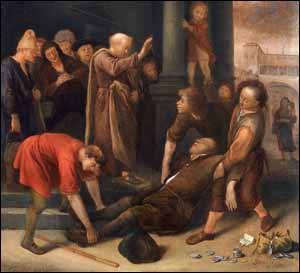 Jan Steen, detail of 'The Death of Ananias' (1651), oil on canvas, 17.9 x 14.8 in., private collection. |
As the ministry of the early church develops, we see Peter emerging as a man of tremendous spiritual authority and power. This isn't exercised so much as administrator of a church of thousands of members. Rather it is a keen spiritual discernment along with powerful healing and evangelistic preaching gifts.
8.1 Ananias and Sapphira (Acts 5)
One example of this spiritual authority occurs when Satan tries to corrupt the new church with self-promotion and deceit.
Sharing Everything (Acts 4:32)
The story of the church's care for one another begins almost immediately after Pentecost.
"All the believers were together and had everything in common. Selling their possessions and goods, they gave to anyone as he had need. (Acts 2:44-45)
A bit later we see:
"All the believers were one in heart and mind. No one claimed that any of his possessions was his own, but they shared everything they had." (Acts 4:32)
People aren't asserting private ownership of their possessions; rather they share freely out of love. The key phrase here is "had everything in common." The Greek adjective is koinos, "common" as opposed to private, "pertaining to being of mutual interest or shared collectively, communal, common."289 This kind of sharing is part of the essence of what "fellowship" means, since "fellowship" translates koinōnia, "fellowship, sharing," from koinos, "common." It shows their unity as one body, one family. Deep love lies at the very foundation of fellowship. It has to! Jesus says,
"By this all men will know that you are my disciples, if you love one another." (John 13:35)
Luke goes on to describe the situation at this stage of the church's life.
"There were no needy persons among them. For from time to time those who owned lands or houses sold them, brought the money from the sales 35 and put it at the apostles' feet, and it was distributed to anyone as he had need." (Acts 4:34-35)
Barnabas, later a missionary to Antioch, is an example of this kind of generosity (Acts 4:36-37). At this point, the apostles are administering the common fund and care for the poor, something that will soon change (Acts 6).
Lying about the Gift (Acts 5:1-11)
Unfortunately, the praise heaped on those who give large gifts attracts some givers with mixed motives.
"1 Now a man named Ananias, together with his wife Sapphira, also sold a piece of property. 2 With his wife's full knowledge he kept back part of the money for himself, but brought the rest and put it at the apostles' feet." (Acts 5:1-2)
Ananias and Sapphira suggest that their gift constitutes the whole amount gained from the sale of the property, but it is only a part. Peter has prophetic insight from the Holy Spirit that Ananias is lying. I would call it a revelation or "word of knowledge" (1 Corinthians 12:8b).
"3 Then Peter said, 'Ananias, how is it that Satan has so filled your heart that you have lied to the Holy Spirit and have kept for yourself some of the money you received for the land? 4 Didn't it belong to you before it was sold? And after it was sold, wasn't the money at your disposal? What made you think of doing such a thing? You have not lied to men but to God.' 5 When Ananias heard this, he fell down and died. And great fear seized all who heard what had happened. 6 Then the young men came forward, wrapped up his body, and carried him out and buried him." (Acts 5:3-6)
But it doesn't stop with Ananias. Shortly thereafter, his wife Sapphira also refuses to tell the truth when questioned by Peter.
"7 About three hours later his wife came in, not knowing what had happened. 8 Peter asked her, 'Tell me, is this the price you and Ananias got for the land?' 'Yes,' she said, 'that is the price.'" (Acts 5:7-8)
Peter gives her a chance to tell the truth, but instead she covers up the truth.
"9 Peter said to her, 'How could you agree to test290 the Spirit of the Lord? Look! The feet of the men who buried your husband are at the door, and they will carry you out also.' 10 At that moment she fell down at his feet and died. Then the young men came in and, finding her dead, carried her out and buried her beside her husband." (Acts 5:9-10)
Here "testing God" is the sin of questioning whether God really can do something, especially, whether God will even notice sin and will actually punish it.291Testing God is a symptom of unbelief, a kind of arrogance that thinks it can get away with something by just lying about it -- even if it is about holy things.
Ananias and Sapphira are not criticized for private ownership or partial giving. Rather, their sins are:
- Lying. The problem is that Ananias lies about the gift, that what he gave constitutes the entire amount from the sale. The sin here is not motivated by greed, I don't think, but by pride and a desire for his gift to be seen as greater than it actually is. He fails to follow Jesus' command in the Sermon on the Mount to give privately, secretly, not to draw praise from others (Matthew 6:1-4).
- Unbelief or testing God. The unbelief is found in Ananias' thought that he can lie and God won't call him to account.
- Disdain for the holiness of Christ's Church. Ananias lies not to the people in the congregation, but to the Holy Spirit (Acts 5:3-4). The church is the temple of the Holy Spirit. Thus a sin against the church is a sin against the Holy ourselves vulnerable to severe judgment.
- Disdain for church leaders. Lying to church leaders, thus disrespecting them, is the same as disrespecting God himself, since they are serving God on God's behalf. In the same manner, the writer of Hebrews exhorts us: "Obey your leaders and submit to their authority. They keep watch over you as men who must give account" (Hebrews 13:17).
Rather awesome teaching!
As a result of the judgment upon Ananias and Sapphira, there is a new kind of holy reverence for the sanctity of the church and authority of her leaders.
"Great fear seized the whole church and all who heard about these events." (Acts 5:11)
We may be too quick to dismiss fear on the basis of John's observation that "perfect love drives out fear" (1 John 4:18). Our problem today is that too few believers really love God enough to obey him, and too many are rather careless and flippant with holy things. It is quite true: "The fear of the Lord is the beginning of wisdom" (Proverbs 4:10). We need a healthy fear of God! Help us, Lord Jesus!
We learn some things about Peter in this passage. First, he seems to be a prominent leader of the Jerusalem Church at this time since Ananias' and Sapphira's gift is brought to him.
Second, Peter has prophetic insight into Ananias's motivation for giving. God shows him his sin.
Third, Peter acts with tremendous authority along the lines of an Old Testament prophet such as Nathan who confronts David's sin and pronounces God's judgment. This doesn't mean that Peter always acts in these roles. But for now, this is what God is calling him to do by the power of the Spirit.
Q39. (Acts 5:1-11) What does this passage teach us about Peter's role in the church at this time? What does it teach about the sanctity of Christ's Church? What does it teach us about giving?
8.2 Peter's Shadow Heals (Acts 5:15)
The swift judgment upon Ananias and Sapphira brings a new sense of awe to the church and the surrounding community. I don't doubt that many confess secret sins and get right with God.
Sometimes we imagine that in apostolic days miracles are an everyday occurrence. For the most part, however, they seem to be more occasional. But at this particular time, miracles become quite common in Jerusalem.
"12 Now many signs and wonders were regularly done among the people by the hands of the apostles. And they were all together in Solomon's Portico. 13 None of the rest dared join them, but the people held them in high esteem." (Acts 5:12-13)
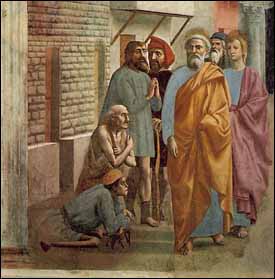 Masaccio, detail of 'St. Peter Healing the Sick with His Shadow' (1426-27), fresco, 230 x 162 cm., Capella Brancacci, Santa Maria del Carmine, Florence. |
A sense of awe now surrounds the apostles and the growing band of disciples. These miracles also bring about lots of evangelism. Conversions multiply.
"More and more men and women believed in the Lord and were added to their number" (Acts 5:14)
This seems to be a unique time of healings that attract crowds of people.
"The people also gathered from the towns around Jerusalem, bringing the sick and those afflicted with unclean spirits, and they were all healed." (Acts 5:16)
It sounds like some times in Jesus' ministry when healing was the primary focus of his ministry and attraction of crowds. Look carefully at this account.
"23 Jesus went throughout Galilee ... healing every disease and sickness among the people. 24 News about him spread all over Syria, and people brought to him all who were ill with various diseases, those suffering severe pain, the demon-possessed, those having seizures, and the paralyzed, and he healed them." (Matthew 4:23--24)
As it happened to Jesus, so it happens to his disciples, who are now prepared to minister.
Healing via Proximity to Holy People and Objects (Acts 5:15)
Peter seems to be at the center of this healing revival in Jerusalem. Observe a pair of verses, the first from Jesus' ministry, the second from Peter's ministry.
"Wherever [Jesus] went ... they placed the sick in the marketplaces. They begged him to let them touch even the edge of his cloak, and all who touched him were healed." (Mark 6:55-56)
"They even carried out the sick into the streets and laid them on cots and mats, that as Peter came by at least his shadow might fall on some of them." (Acts 5:15)
In both instances the healing is removed a bit from the person's hands for healing, to his clothing and his shadow. We also see an instance of this type in Paul's ministry in Ephesus.
"11 God did292 extraordinary miracles through Paul, 12 so that even handkerchiefs and aprons that had touched him were taken to the sick, and their illnesses were cured and the evil spirits left them." (Acts 19:11-12)
Luke refers to cloths that had touched Paul, such as a cloth used to wipe away perspiration,293 or "sweat-rags" tied around his head while he worked.294 "Aprons" probably refers to a worker's apron Paul would have worn as a tentmaker.295
How are we to understand such phenomena? There are biblical precedents. Contact with the bones of Elisha brings a man back to life (2 Kings 13:21).
Catholic and Orthodox churches commonly display relics. A relic "usually consists of the physical remains or personal effects of a saint or other person preserved for the purpose of veneration as a tangible memorial."296These relics are placed in richly-decorated reliquaries. The great cathedrals of Europe were typically built by gathering relics, which then attracted wealth from pilgrimages of the faithful to view the relics (after paying a small entry fee) and seek healing from being in their presence. And some people were healed there. The money was used to build the cathedral, and perhaps purchase more relics.
Pentecostalism has seen something like this. I remember as a young man listening to radio programs where the evangelist offered to send out "anointed prayer cloths" to listeners who gave an offering. Pete Wagner relates an incident from Nigeria of a person raised from the dead as a result of placing a "blessed handkerchief" on a corpse with prayer in Jesus' name.297
What's going on here? Is this some kind of belief in magic? Of course, it can become that. But at its root, these are physical objects where faith can be focused. Healing evangelist Oral Roberts (1918-2009) would ask listeners to place their hands on their radio or television as a "point of contact" while he prayed for them. I have found that a helpful explanation.
We need to avoid magical beliefs, of course, and keep our focus on the Living Christ himself. Particularly, we shouldn't be taking advantage of people's superstitions. We realize, however, that healing usually occurs through a person's faith and that sometimes a physical object can stimulate or encourage faith.
Q40. (Acts 5:15) What does healing via Peter's shadow teach us about Peter? About how Peter was perceived by the populace? How do you think Peter kept humble when he was the object of such reverence and powerful results? How can physical objects and phenomena assist in people being healed?
8.3 The Apostles' Arrest (Acts 5:17-29)
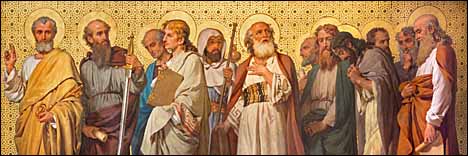 Enrico Reffo, 'Twelve Apostles' (1914), fresco, Chiesa di San Dalmazzo, Turin, Italy. Larger image. |
It must have been a heady time for the twelve apostles. But all this honor and adulation came with a cost -- jealousy from the Jewish leaders. They had killed Jesus when he threatened their primacy. Now they see the apostles as the same kind of threat.
"17 Then the high priest and all his associates, who were members of the party of the Sadducees, were filled with jealousy. 18 They arrested the apostles and put them in the public jail. 19 But during the night an angel of the Lord opened the doors of the jail and brought them out. 20 'Go, stand in the temple courts,' he said, 'and tell the people the full message298of this new life.' 21aAt daybreak they entered the temple courts, as they had been told, and began to teach the people." (Acts 5:17-21a)
I love the contrasts between verses 18 and 19. "They arrested ... but ... an angel of the Lord opened the doors...." Jesus' enemies can do their worst to curtail the gospel. But God is not limited by evil men or by prison doors.
The chief priests arrest the apostles, seeking to stop the Gospel, but God has the last word. And when the Sanhedrin expects to condemn the apostles in its morning session, they don't show up.
"Then someone came and said, 'Look! The men you put in jail are standing in the temple courts teaching the people.'" (Acts 5:25)
Luke tells the story with both irony and humor.
The chief priest sends the captain of the guard to the temple to fetch the apostles, but they are uncharacteristically gentle in this arrest. When they finally appear before the Sanhedrin, the high priest tells them off: "We ordered you not to teach in Jesus' name." But the apostles appeal to a higher authority.
"Peter and the other apostles reply: 'We must obey God rather than men!" (Acts 5:29)
Imagine the gasp that goes through the Sanhedrin and the crowded gallery of observers when Peter publicly questions the authority of the high priest. Of course, everyone in the assembly knew he was corrupt like the rest of his family, but still -- this just isn't done!
Peter's Clear Testimony (Acts 5:30-32)
Now Peter gives a clear witness and indictment of the high priest and the whole Council who had condemned Jesus, as Jesus prophesied that they would.
"12 They will lay hands on you and persecute you. They will deliver you to synagogues and prisons, and you will be brought before kings and governors, and all on account of my name. 13 This will result in your being witnesses to them.... 15 For I will give you words and wisdom that none of your adversaries will be able to resist or contradict." (Luke 21:12-13, 15)
They had prayed for boldness. Now it comes, empowered by the Holy Spirit. Peter declares:
"30 The
God of our fathers raised Jesus from the dead -- whom you had killed by hanging
him on a tree. 31 God exalted him
to his own right hand as Prince and Savior that he might give repentance and
forgiveness of sins to Israel.
32 We are witnesses of these
things, and so is the Holy Spirit, whom God has given to those who obey him.'" (Acts 5:30-32)
Let's examine the elements of the testimony that Peter gives before the Council.
1. Israel's God, "the God of our fathers" has acted. This is not some new religion or false God. This is the action of their own God.
2. Jesus is raised from the dead. If reports of Jesus' resurrection and the Jewish cover-up weren't common knowledge in Jerusalem, Peter would have been contradicted by the Council. But they are silent. The resurrection of Jesus is God's final word on Jesus, and it is incontrovertible and widely acknowledged in Jerusalem.
3. The Jewish leaders had condemned Jesus to death, and are responsible for having the Romans crucify him. Yes, Peter is "determined to make us guilty of this man's blood" (Acts 5:28b). Peter deliberately uses the language of the Torah regarding capital punishment of being "hung on a tree" (Deuteronomy 21:22-23). In this case, however, the judges have acted corruptly. Instead of the condemned man being under God's curse, he is rather exalted by God to the highest place.
4. God has exalted Jesus to the place of honor as Prince. Peter is referencing a well-known Messianic psalm.
"The Lord
says to my Lord:
'Sit at my right hand
until I make your enemies
a footstool for your feet.'" (Psalm 110:1)
In other words, Jesus is the fulfillment of this messianic Psalm299Peter declares Jesus as "Prince" or "Leader," archēgos, "one who has a preeminent position, leader, ruler, prince."300
5. Jesus is Israel's Savior from sin. Peter also declares Jesus as "Savior," sōtēr, "one who rescues, savior, deliverer, preserver."301Jesus is the One God has appointed to "give repentance and forgiveness of sins to Israel" (Acts 5:31). We often think of repentance as man's part and forgiveness as God's part -- and there is a truth to that. But here and elsewhere in the New Testament is the parallel truth that God "gives" or "grants" the ability to repent, as well as the forgiveness from sin (Acts 11:18; Zechariah 12:10; 2 Timothy 2:25). Christ's Holy Spirit brings "prevenient grace" to sinners to enable them to repent and receive forgiveness.
6. The apostles claim to be eyewitnesses to these things. "We are witnesses of these things" (Acts 5:32a). After all, this is a formal hearing and the rules of evidence require the testimony of two or more witnesses to establish an assertion. Here, all twelve of the apostles serve as "a witness ... of his resurrection" (Acts 1:22).
7. The outpouring of the Holy Spirit is an additional testimony. It is fascinating that Peter calls as a witness the outpouring of the Holy Spirit that had occurred publicly in Jerusalem a few months previously.
Peter's testimony is brief but powerful. He challenges the very authority of the Sanhedrin before which he appears. They have killed the Messiah God sent to Israel, while the apostles are obeying Jesus the Messiah.
Gamaliel's Counsel (Acts 5:33-42)
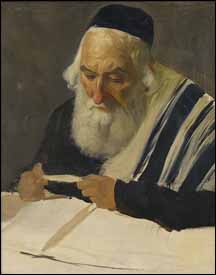 Lazar Krestin (1868-1938), 'Rabbi Reading,' oil on canvas, 21.6 x 17.7 in., private collection. |
Peter's testimony on the day of Pentecost is met with widespread conviction and repentance. But here, before Israel's leaders, it is met with fury!
"When they heard this, they were furious and wanted to put them to death." (Acts 5:33)
Gamaliel intervenes. Rabbi Gamaliel I (who died 52 AD) was the grandson of the famous Rabbi Hillel, founder of the more liberal of the two main schools of the Pharisees. He was a member of the Sanhedrin and a "teacher of the law." He was known for his tolerance, recommending a less burdensome sabbath observance, protecting women who had been divorced, and urging kindness towards Gentiles. Saul of Tarsus (later known as the Apostle Paul) trained under Gamaliel in Jerusalem (Acts 22:3). Gamaliel's reputation among Jews to this day is as one of the greatest teachers in the history of Judaism.302
Gamaliel counsels caution.
"If their purpose or activity is of human origin, it will fail. But if it is from God, you will not be able to stop these men; you will only find yourselves fighting against God." (Acts 5:38-39)
Gamaliel's wisdom sways the Sanhedrin.
"His speech persuaded them. They called the apostles in and had them flogged. Then they ordered them not to speak in the name of Jesus, and let them go." (Acts 5:40)
They let the apostles go, expecting the Christian movement to die out. It turns out they were wrong! Very wrong!
Persecution Doesn't Stop the Apostles (Acts 5:41-42)
Their backs are bloody but the apostles are undeterred.
"The apostles left the Sanhedrin, rejoicing because they had been counted worthy of suffering disgrace for the Name. Day after day, in the temple courts and from house to house, they never stopped teaching and proclaiming the good news that Jesus is the Christ." (Acts 5:41-42)
Q41. (Acts 5:17-29) What role does Peter have before the Sanhedrin? Peter had experienced fear and denial at the high priest's house a few months ago. How is he different now? To what do you attribute it?
Appointing the Seven (Acts 6:1-6)
In Acts 6 the administrative burden of the Jerusalem church is weighing on the apostles. They call all the disciples together into a large meeting and say,
"It is not right that we should give up preaching the word of God to serve tables." (Acts 6:2)
It is now time to focus on their particular responsibilities as apostles. So the Jerusalem congregation nominates seven capable men to oversee the daily food distribution, and other tasks, and the apostles say,
"We will devote ourselves to prayer and to the ministry of the word." (Acts 6:4)
Note that the apostles as a group are saying this. It is a mutual decision. Whatever his leadership role entails, Peter isn't a sole decision maker in the Jerusalem Church. Nor are the apostles dictators. Rather, they are leaders of the new body of believers.
One of these seven Greek-speaking men begins exercising a powerful preaching and healing ministry in Jerusalem among the Greek-speaking Jews. His name is Stephen. He is eventually brought before the Sanhedrin and stoned to death -- with Saul of Tarsus holding the garments of those killing him. Now in about 36 AD the church in Jerusalem goes through a period of intense persecution led by Saul.
Intense Persecution (Acts 8:1-4)
 Judea and Samaria at the time of Saul's persecution. Larger map. |
"Persecution" (diōgmos) refers to "a program or process designed to harass and oppress someone, persecution" for reasons of belief. Luke describes it as a "great persecution," suggesting extreme intensity and zeal.303As the Sanhedrin had decided to release the apostles (Acts 5:40), perhaps they are exempted from persecution for now, for they remain in Jerusalem, but others flee, especially the Greek-speaking Christians.
One of the ironies of Saul's persecution is that God uses the persecution to spread the gospel far beyond its beginnings in Jerusalem.
"On that day a great persecution broke out against the church at Jerusalem, and all except the apostles were scattered304throughout Judea and Samaria.... 4 Those who had been scattered preached the word wherever they went."305(Acts 8 :1, 4)
"Now those who had been scattered by the persecution in connection with Stephen traveled as far as Phoenicia, Cyprus and Antioch...." (Acts 11:19)
8.4 Peter and John Minister in Samaria (Acts 8:5-25)
Philip, another one of the Seven, isn't a Palestinian Jew, but a Jew born abroad. About 37 to 38 AD, he and many other believers are driven from Jerusalem by the persecution. Philip begins a spectacular ministry in Samaria.
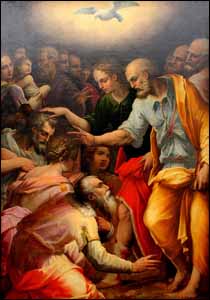 Giorgio Vasari, 'Apostles Peter and John Blessing the People of Samaria' (1557), Gemäldegalerie, Staatliche Museen, Berlin. Larger image. |
Samaria is an area where the Jewish leaders wield little influence, since the Samaritans and Jews had excommunicated each other centuries before. The Samaritans had worshipped in a temple they built on Mount Gerizim in the mid-5th century BC. Jewish extremists destroyed it in the 2nd century BC. There was no love lost between the Jews and Samaritans.
The Holy Spirit Falls (Acts 8:14-17)17)
Philip has a powerful preaching ministry, accompanied by miraculous healings and spectacular exorcisms. Many are converted. Philip goes ahead and baptizes them. However, they don't seem to receive the Holy Spirit as expected, with manifestations of speaking in tongues and prophecy.306 Something is wrong. So Philip sends to Jerusalem for help. Luke tells us:
"When the apostles in Jerusalem heard that Samaria had accepted307the word of God, they sent Peter and John to them." (Acts 8:14)
Notice at this point the apostles are making decisions as a body. Though Peter is seen as a leader and spokesman, he isn't the sole decision-maker.
Peter and John, members of Jesus' inner circle, travel north to Samaria to investigate.
"15 When they arrived, they prayed for them that they might receive the Holy Spirit, 16 because the Holy Spirit had not yet come upon any of them; they had simply been baptized into the name of the Lord Jesus. 17 Then Peter and John placed their hands on them, and they received the Holy Spirit." (Acts 8:15-17)
Why is the Spirit's manifestation delayed in Samaria? We are not told. But I expect it is to cause the mother church in Jerusalem to give official sanction that believing Samaritans are now full Christians.
Q42. (Acts 8:14-17) What does it tell us about Peter and John that they are selected for this sensitive mission to Samaria? What does this tell us about Peter's spiritual power? Why doesn't the Spirit fall on the Samaritans when they are first converted?
8.5 Peter Rebukes Simon the Sorcerer (Acts 8:9-11, 18-24)
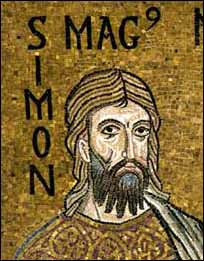 'Simon Magus,' detail of 'Peter, Paul, Simon Magus and Nero' (1140-70), mosaic, Palatine Chapel, nave, north side aisle, Palermo, Italy. |
Interwoven into the story of the Samaritan revival is the account of Simon the Sorcerer, sometimes known as Simon Magus. Simon's part in the narrative teaches us some important things about the Holy Spirit and Peter's ministry.
"9 Now for some time a man named Simon
had practiced sorcery in the city and amazed all the people of Samaria. He
boasted that he was someone great, 10 and all the people, both high
and low, gave him their attention and exclaimed, 'This man is the divine power
known as the Great Power.'
11 They followed him because he had amazed them for a long time with
his magic." (Acts 8:9-11)
"Practiced sorcery" (NIV, KJV), "practiced magic" (ESV, NRSV) is the verb mageuō.308] But this isn't the modern-day sleight-of-hand magician pulling rabbits out of hats. This is kind of a cross between folk Judaism, magic healing remedies, wearing amulets, casting spells, and reliance on special incantations. No doubt there is a strong element of the demonic, since you find such sorcerers opposing the message of Christ (Acts 13:6-12).
You probably wouldn't find this kind of sorcery in orthodox Jerusalem due to strong prohibitions in the Pentateuch,309but the Jewish communities in the pagan cities of the Mediterranean are subject to syncretism with the mystery religions that flourish at this time. Jewish sorcery doesn't seem to be that uncommon.310
Simon Magus seems to enjoy the status and control he has had in Samaria and is filled with pride. "He boasted that he was someone great" (Acts 8:9), thriving on being the center of attention. The people call him "the divine power known as the Great Power" (Acts 8:10b) for he amazes them with what he could do. This is little short of blasphemy!
But Simon is completely outclassed by the signs and wonders that Philip performs in Samaria and he becomes a believer -- how sincere, we do not know.
"Simon himself believed and was baptized. And he followed Philip everywhere, astonished by the great signs and miracles he saw." (Acts 8:13)
He probably follows Philip around to see if he could learn the trick of the miracles so he can reproduce them.
Rebuke (Acts 8:18-24)
When Simon sees the apostles convey the Spirit, he wants that power also.so.
"18 When Simon saw that the Spirit was given at the laying on of the apostles' hands, he offered them money 19 and said, 'Give me also this ability so that everyone on whom I lay my hands may receive the Holy Spirit.'" (Acts 8:18-19)
Peter, with prophetic insight into Simon's character and motives, rebukes him sharply.
"May your money perish with you, because you thought you could buy the gift of God with money!" (Acts 8:20)
"May your money perish with you," sounds a bit strong, but a rough translation of the Greek might be: "May you burn in hell with your money!" The sense of the Greek is "annihilation."311To try to purchase spiritual power makes this an entirely transactional exchange for something that God gives away free -- "the gift of God."
Peter pierces right into Simon's heart.
"21 You have no part or share in this ministry, because your heart is not right before God. 22 Repent of this wickedness and pray to the Lord. Perhaps he will forgive you for having such a thought312in your heart. 23 For I see that you are full of bitterness and captive to sin." (Acts 8:21-23)
"Your heart is not right" is our way of expressing it. The text uses the contrast between straight and crooked to express moral uprightness.313Peter doesn't sense that Simon is completely beyond hope, but neither does he offer strong assurance.314Peter analyses Simon's condition by means of the Spirit, what we would probably call the "word of knowledge." He sees:
- Wickedness. So often we soften our perception of our own sins as excusable weakness. Peter calls it for what it is: depravity and wickedness,315 the opposite of any virtue.
- Bitterness. "Full of bitterness" (NIV) or "gall of bitterness" (ESV, NRSV, KJV). Perhaps this Semitic idiom suggests "bitter poison" or "bitter envy."316Perhaps he is jealous and bitter because the attention is now going to someone else besides him.
- Captive to sin (NIV) or perhaps "chains of wickedness" (NRSV).317Jesus teaches that when we practice sin, it begins to exert a hold on us that cannot be easily broken.318Sin is not free. We need the deliverance of Jesus to set us free from its hold on our behavior and thinking.
Peter's words frighten Simon.
"Then Simon answered, 'Pray to the Lord for me so that nothing you have said may happen to me.'" (Acts 8:24)
I wish I could report that Simon repented and his life changed. While there is probably some confusion here, the Church Fathers indicate that Simon Magus continues in sin, becomes the father of Gnosticism, and spawns an heretical sect. Tradition tells us that Peter encounters an unrepentant Simon again in Rome (See Lesson 11.4.)319
Seeking to use spiritual gifts for personal gain is at the root of Simon Magus's sin, as well as jealousy and pride. Using money to obtain a spiritual power or to purchase influence in the church or in heaven is deeply offensive to God. The sin of simony is named after Simon Magus, the sin of buying and selling ecclesiastical offices.
 Available in book versions: paperback, PDF, and Kindle |
Once Jesus had prohibited the disciples from preaching the Kingdom in Samaritan towns (Matthew 10:5), but no more (Acts 1:8). On their way back to Jerusalem, Peter and John preach their way through Samaria.
"When they had testified and proclaimed the word of the Lord, Peter and John returned to Jerusalem, preaching the gospel in many Samaritan villages." (Acts 8:25)
Q43. (Acts 8:5-25) What does the incident with Simon the Sorcerer teach us about Peter's spiritual gifts? About his authority? Why must Simon's sin be exposed and condemned publicly rather than dealt with privately? How is Simon's sin similar to that of Ananias and Sapphira? How is it different?
As Jews, the early believers in the Jerusalem church have tended to ignore that they were to be "a light to the nations." Rather they tend to shun Samaritans and Gentiles. This breakthrough in Samaria begins to change the way the Jerusalem church looks at the recipients of salvation. And there is more to come. Beyond the Samaritan half-Jews, God has his eye on rank Gentiles as we'll see in Acts 10 (Lesson 9.5).
Prayer
Father, it encourages us to see Peter changed from a bold, bumbling disciple to a powerful, effective apostle. There is hope for us! Teach us, Lord, what our spiritual gifts are so that we can begin to move into them and exercise them with power. Show us your mercy and favor, we pray, in Jesus' name. Amen.
Lessons for Disciples
In this next phase of Peter's ministry, we learn new lessons.
- By discernment from the Holy Spirit, Peter exposes in Ananias and Sapphira the sins of lying, unbelief or testing God, disdain for the church's holiness, and disdain for church leaders. Peter accurately prophesies their death (Acts 5; §8.1).
- People's faith in Jesus for healing is inspired by even Peter's shadow touching them. Sometimes physical objects can aid faith, so long as they don't create idolatry or magical thinking (Acts 5:15; §8.2)
- When the twelve apostles are arrested, Peter speaks for them before the Sanhedrin pointing to Jesus' resurrection, God's exaltation of Jesus, Jesus as Savior from sin, and the culpability of the Jewish leaders in Jesus' death (Acts 5:17-29; §8.3).
- Even when ordered by the Sanhedrin not to speak in Jesus' name, the apostles never stop proclaiming the good news of Jesus (Acts 5:41-42; §8.3).
- When Philip preaches in Samaria, he sees many healings, salvation, and baptisms. But when there isn't a clear manifestation of the Holy Spirit, the Jerusalem church sends Peter and John. They lay on hands, and there is a clear manifestation. This delay in the coming of the Spirit is probably to give the Jerusalem church time to accept that non-Jews can be saved (Acts 8:5-15; §8.5).
- Peter rebukes Simon the Sorcerer with great authority for wanting to purchase the ability to convey the Spirit through the laying on of his hands. Through the Spirit, Peter discerns wickedness, bitterness, and captivity to sin (Acts 8:5-25, §8.5).
Key Verses
"All the believers were one in heart and mind. No one claimed that any of his possessions was his own, but they shared everything they had." (Acts 4:32, NIV)
"They even carried out the sick into the streets and laid them on cots and mats, that as Peter came by at least his shadow might fall on some of them." (Acts 5:15, NIV)
"Peter and the other apostles replied: 'We must obey God rather than men!'" (Acts 5:29, NIV)
"God exalted [Jesus] to his own right hand as Prince and Savior that he might give repentance and forgiveness of sins to Israel. We are witnesses of these things, and so is the Holy Spirit, whom God has given to those who obey him." (Acts 5:30-32, NIV)
"The apostles left the Sanhedrin, rejoicing because they had been counted worthy of suffering disgrace for the Name. Day after day, in the temple courts and from house to house, they never stopped teaching and proclaiming the good news that Jesus is the Christ." (Acts 5:41-42, NIV)
"Then Peter and John placed their hands on them, and they received the Holy Spirit." (Acts 8:17, NIV)
End Notes
[289] "Shared" (NIV), "held/had in common" (ESV, NRSV, KJV) is two words, the adjective hapas, "all, the whole," plural, "all together," here, "everything" (BDAG 98, 2); and the adjective koinos, "common" (BDAG 551, 1a).
[290] Peirazō, "to endeavor to discover the nature or character of something by testing, try, make trial of, put to the test" (BDAG 792, 2c).
[291] Exodus 17:2, 7; Numbers 14:22; Isaiah 7:12; Psalm 77:41, 56; 1 Corinthians 10:9; Hebrews 3:9; Acts 15:10.
[292] The verb in verse 11 is in the imperfect tense, suggesting that the miracles kept on happening, that they weren't just a one-time occurrence. "Extraordinary" (NIV, ESV, NRSV), "special" (KJV) is a three-word phrase, literally, "not the ones having commonly occurred." The verb is tynchanō, "to prove to be in the result, happen, turn out" (BDAG 1019, 2d).
[293] "Handkerchiefs" is soudarion. This is a Latin loanword that means "face-cloth for wiping perspiration," corresponding somewhat to our "handkerchief." However, the word here probably is simply "a cloth," as it is in John 11:22; 20:7; and Luke 19:20 (BDAG 934).
[294] Bruce, Acts, p. 389.
[295] "Aprons" is another Latin loanword, simikinthion, "apron," such as is worn by workers (BDAG 923).
[296] Wikipedia article on "Relic."
[297] Wagner, Acts, pp. 437-438. He cites the story of William Kumyui, pastor of a huge Deeper Life Church in Logos, Nigeria.
[298] "Message" (NIV, NRSV), "words" (ESV, KJV) is the plural of the noun, rhēma, "that which is said, word, saying, expression, or statement of any kind (BDAG 905, 1). I've heard preachers make a big deal about rhēma vs. logos, but I don't see that in my studies of Greek words. Rhēma has the idea of what is definitely or expressly stated, "statement." Logos, on the other hand, can refer to narrative, word, speech, and many nuances such as proverb, command, etc. (see E. Lohse, legō, logos, rhema, ktl., TDNT 9:682-684).
[299] Acts 2:33; 7:55-56; Romans 8:34; Ephesians 1:20; Colossians 3:1; Hebrews 1:3; 10:12; 1 Peter 3:22.
[300] Archēgos, BDAG 138, 1. This use of "prince" doesn't imply son of a king, as it does in English, but "one who has a preeminent position."
[301] Sōtēr, BDAG 985, b.
[302] R. F. Youngblood, "Gamaliel," ISBE 2:393-394.
[303] "Persecution" is the noun diōgmos (BDAG 253). "Great" is megas.
[304] "Regions" (ESV, KJV), "countryside" (NRSV) is chōra, "district, region, place," then "the open country in contrast to the city, 'country'" (BDAG 1093, 3). The NIV omits translating this word. "Scattered throughout" (NIV, ESV, NRSV), "scattered abroad throughout" (KJV) is two words, "scattered" is the passive aorist of the verb diaspeirō, "scatter," passive of scattered communities of Christians (Acts 8:1, 4; 11:19; BDAG 236). "Throughout" is kata, "extension in various directions within an area, throughout" (so in Luke's writings) (BDAG 511, 1c).
[305] "Went" is the aorist indicative of dierchomai, "go through," here, "to travel or move about go about from place to place" (BDAG 244, 1a).
[306] Some have made this into a doctrine: that the necessary evidence of the baptism of the Holy Spirit is speaking in tongues. Though I can understand how they got there, I find that while tongues, praise, and prophecy were often present in the early days, the scarcity of the mention of speaking tongues in the New Testament outside of Acts suggests that such a restrictive doctrine of tongues as "necessary evidence" of the Spirit Baptism is overstated and goes beyond the teaching of the apostles. See Disciple's Guide to the Holy Spirit (JesusWalk Publications, 2018), lesson 6, "Baptized with the Holy Spirit" (www.jesuswalk.com/spirit/06_spirit_baptized.htm), and my essay, "Spirit Baptism, the New Birth, and Tongues" (https://www.joyfulheart.com/scholar/spirit-baptism.htm).
[307] "Received" (ESV, KJV), "accepted" (NIV, NRSV) is the perfect passive of the verb dechomai, "to indicate approval or conviction by accepting, be receptive of, be open to, approve, accept," of things (BDAG 221, 5).
[308] Mageuō, "practice magic" (BDAG 608).
[309] Exodus 22:18; Deuteronomy 18:10-14; Leviticus 19:26b.
[310] See C. E. Arnold, "Magic and Astrology," DLNT, pp. 702-703. In Acts we see (1) Simon Magus in Samaria (Acts 8:9-24), Bar-Jesus in Paphos, Crete (Acts 13:6-12), and the Seven sons of Sceva and those who had valuable magic scrolls in Ephesus (Acts 19:13-19).
[311] "Perish" is the preposition eis, "unto" and the noun apōleia, "annihilation" both complete and in process, "ruin." (BDAG 127, 2).
[312] "Thought" (NIV, KJV), "intent" (ESV, NRSV) is epinoia, "the result of a thought process, thought, conception" (BDAG 376).
[313] "Right" is the adjective euthus, "straight," figuratively, "proper, right, upright" (BDAG 406, 2b).
[314] The Greek particle ara casts doubt on the outcome, used here to "to express something tentative, perhaps, conceivably." In addition to its inferential meaning, ara is employed in the context of the tentative, the uncertain, the unresolved, the contingent, e.g. possibly" (BDAG 127, 3).
[315] "Wickedness" is kakia, "the quality or state of wickedness, baseness, depravity, wickedness, vice," the opposite of aretē ["excellence of character"] and all virtue. (BDAG 500, 1).
[316] "Full of bitterness" (NIV), "in the gall of bitterness" (ESV, NRSV, KJV) is two words: the noun cholē, "gall, bile," here "a substance with an unpleasant taste, something bitter, gall" (BDAG 1085, 2); and the adjective pikria, "bitterness," here, bitter gall." (BDAG 813, 1). This Semitic idiom probably means "bitter poison" or perhaps "bitter envy" (Lexham English Bible).
[317] "Captive to sin" (NIV), "the bond of iniquity" (ESV, KJV), "the chains of wickedness" (NRSV) is two words: syndesmos, "that which binds together," here, "a bond that confines/hinders, fetter" (BDAG 966, 3); and adikia, "the quality of injustice, unrighteousness, wickedness, injustice" (BDAG 20, 2).
[319] Whether the Simon who appears in Rome is the same person as Simon of Samaria isn't clear, however. See Wikipedia article on "Simon Magus." Also D.E. Aune, "Simon Magus," ISBE 4:516-518.
Copyright © 2025, Ralph F. Wilson. <pastor![]() joyfulheart.com> All rights reserved. A single copy of this article is free. Do not put this on a website. See legal, copyright, and reprint information.
joyfulheart.com> All rights reserved. A single copy of this article is free. Do not put this on a website. See legal, copyright, and reprint information.

|

|
In-depth Bible study books
You can purchase one of Dr. Wilson's complete Bible studies in PDF, Kindle, or paperback format -- currently 48 books in the JesusWalk Bible Study Series.
Old Testament- Abraham, Faith of
- Jacob, Life of
- Moses the Reluctant Leader
- Joshua
- Gideon
- David, Life of
- Elijah
- Psalms
- Solomon
- Songs of Ascent (Psalms 120-134)
- Isaiah
- 28 Advent Scriptures (Messianic)
- Daniel
- Rebuild & Renew: Post-Exilic Books
Gospels
- Christmas Incarnation (Mt, Lk)
- Sermon on the Mount (Mt 5-7)
- Luke's Gospel
- John's Gospel
- Seven Last Words of Christ
- Parables
- Jesus and the Kingdom of God
- Resurrection and Easter Faith
- Apostle Peter
Acts
Pauline Epistles
- Romans 5-8 (Christ-Powered Life)
- 1 Corinthians
- 2 Corinthians
- Galatians
- Ephesians
- Philippians
- Colossians, Philemon
- 1 & 2 Thessalonians
- 1 &2 Timothy, Titus
General Epistles
Revelation
Topical


